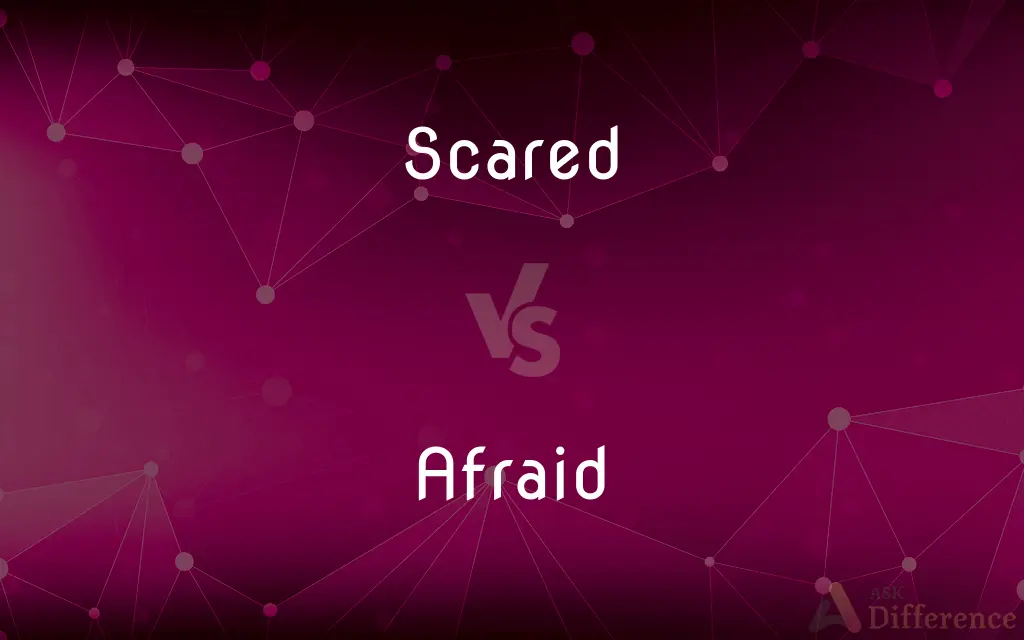Scared vs. Afraid — What's the Difference?
By Tayyaba Rehman & Urooj Arif — Updated on March 21, 2024
Scared and afraid both describe a feeling of fear, but scared often implies a sudden or immediate reaction, whereas afraid can denote a more sustained or generalized emotion.

Difference Between Scared and Afraid
Table of Contents
ADVERTISEMENT
Key Differences
Scared is typically used to describe a sudden, often intense feeling of fear that is usually caused by an immediate threat or danger. This reaction can be both physical and emotional, causing one to feel anxious, jittery, or even to freeze up in the moment. On the other hand, afraid tends to be used for a more sustained, sometimes less intense feeling of fear that can linger over time. It can be related to specific situations, things, or even existential concerns but doesn't necessarily imply an immediate reaction.
While both terms are often used interchangeably in everyday language, the nuances between them can help convey the subtleties of different fear experiences. Understanding these differences can be crucial in accurately describing one's emotions or in literary and artistic expressions to evoke the desired emotional response from an audience.
The choice between scared and afraid can also be influenced by the context or the speaker's preference. Some might prefer "scared" for its immediacy and intensity, while others might choose "afraid" for its ability to encompass a wider range of fear-based emotions, from mild unease to deep-seated phobias.
In terms of linguistic nuances, "scared of" is a common phrase, suggesting a specific cause of fear, while "afraid of" can be used in the same way but might also be part of broader, more abstract expressions like "afraid for the future." This flexibility makes "afraid" slightly more versatile in different contexts.
The cultural and emotional contexts in which these words are used can also affect their interpretation. In some situations, "scared" might be seen as a more childlike or less serious expression of fear, while "afraid" can carry a more mature or grave connotation, adding layers of meaning beyond the words themselves.
ADVERTISEMENT
Comparison Chart
Intensity
Often implies a higher, sudden intensity
Generally denotes a sustained, possibly less intense emotion
Duration
Typically short-term, immediate
Can be more long-lasting, pervasive
Context
Used in more specific, immediate threats
Used in both specific and general fears
Linguistic Flexibility
Commonly used with "of" to denote cause
Versatile, used in abstract and specific contexts
Connotation
Can imply a less mature or serious fear
May carry a more mature or grave connotation
Compare with Definitions
Scared
Feeling frightened or panicked by a specific, often sudden event.
I was scared when the lights went out unexpectedly.
Afraid
Feeling fear or anxiety about a potential or actual situation or outcome.
She was afraid to speak up during the meeting.
Scared
Exhibiting a physical or emotional reaction to an immediate threat.
The loud noise scared the baby, making her cry.
Afraid
Used to express a more reflective or considered fear.
They are afraid of what the future might hold for their children.
Scared
Can imply a less serious or deep-seated fear.
She's scared of clowns, but it's more of a quirky fear than a phobia.
Afraid
Often carries a more serious or profound connotation.
After the accident, he was deeply afraid of driving again.
Scared
Often used in a more casual or informal context.
I'm scared of horror movies; they always give me nightmares.
Afraid
Concerned or worried about a possible negative event.
He's afraid of losing his job in the company downsizing.
Scared
Used to describe the reflexive, instinctual response to danger.
He got scared and jumped back when he saw the snake.
Afraid
Can denote a more enduring or existential fear.
I'm afraid of being alone, not just physically but emotionally.
Scared
To strike with sudden fear; alarm.
Afraid
Filled with fear; frightened
Afraid of ghosts.
Afraid to die.
Afraid for his life.
Scared
To become frightened
A child who scares easily.
Afraid
Having feelings of aversion or unwillingness in regard to something
Not afraid of hard work.
Afraid to show emotion.
Scared
A condition or sensation of sudden fear
That mask gave me a real scare.
Afraid
Filled with regret or concern. Used especially to soften an unpleasant statement
I'm afraid you're wrong.
Scared
A general state of alarm; a panic
A bomb scare that necessitated evacuating the building.
Afraid
Impressed with fear or apprehension; in fear.
He is afraid of death.
He is afraid to die.
He is afraid that he will die.
Scared
Serving or intended to frighten people
Scare stories.
Scare tactics.
Afraid
(colloquial) Regretful, sorry; expressing a reluctance to face an unpleasant situation.
I am afraid I cannot help you in this matter.
Scared
Feeling fear; afraid, frightened.
Afraid
(used with for) Worried about, feeling concern for, fearing for (someone or something).
Scared
Simple past tense and past participle of scare
Afraid
Impressed with fear or apprehension; in fear; apprehensive.
Scared
Made afraid;
The frightened child cowered in the corner
Too shocked and scared to move
Afraid
Filled with fear or apprehension;
Afraid even to turn his head
Suddenly looked afraid
Afraid for his life
Afraid of snakes
Afraid to ask questions
Afraid
Filled with regret or concern; used often to soften an unpleasant statement;
I'm afraid I won't be able to come
He was afraid he would have to let her go
I'm afraid you're wrong
Afraid
Feeling worry or concern or insecurity;
She was afraid that I might be embarrassed
Terribly afraid of offending someone
I am afraid we have witnessed only the first phase of the conflict
Afraid
Having feelings of aversion or unwillingness;
Afraid of hard work
Affaid to show emotion
Common Curiosities
What does it mean to be scared?
Yes, with understanding, coping strategies, and sometimes professional help, people can overcome or manage their fears.
How is being afraid different from being scared?
Cultural contexts can influence the choice and interpretation of these words, with certain cultures or languages favoring one term over the other in translation.
Being scared means feeling fear or anxiety due to a specific, often sudden threat or danger.
Can you overcome being "scared" or "afraid"?
Can "scared" and "afraid" be used interchangeably?
Yes, animals can exhibit behaviors indicative of being "scared" or "afraid," though we interpret these states through observable actions rather than verbal expressions.
Being afraid often refers to a more sustained or generalized feeling of fear, not necessarily tied to an immediate threat.
Does culture influence the use of "scared" vs. "afraid"?
Is "scared" more intense than "afraid"?
While it's not uncommon, "afraid" might be more frequently used in professional contexts due to its broader and sometimes more serious implications.
Can you be "scared" without an immediate threat?
Being "afraid" often involves more cognitive processes and may include fears that have been contemplated or dwelled upon.
Is being "afraid" always related to specific fears?
Yes, being "scared" can trigger physical symptoms like increased heart rate, sweating, or shaking due to adrenaline.
"Scared" often implies a higher, sudden intensity, while "afraid" denotes a potentially less intense but more enduring fear.
Is it normal to use "scared" in a professional setting?
Yes, in many contexts, "scared" and "afraid" can be used interchangeably, though nuances may differ.
Can animals be "scared" or "afraid"?
No, being "afraid" can relate to both specific and more generalized, abstract fears.
Are there physical symptoms associated with being "scared"?
Is "scared" considered less mature than "afraid"?
Yes, "afraid for" can be used to express concern or fear regarding someone else's well-being.
Typically, "scared" implies an immediate reaction to a threat, but it can be used more broadly in informal contexts.
Does being "afraid" always involve conscious thought?
In some contexts, "scared" may carry a less mature or serious connotation compared to "afraid".
Can "afraid" imply a fear for someone else?
Share Your Discovery

Previous Comparison
Hatred vs. Love
Next Comparison
Approval vs. ConcurrenceAuthor Spotlight
Written by
Tayyaba RehmanTayyaba Rehman is a distinguished writer, currently serving as a primary contributor to askdifference.com. As a researcher in semantics and etymology, Tayyaba's passion for the complexity of languages and their distinctions has found a perfect home on the platform. Tayyaba delves into the intricacies of language, distinguishing between commonly confused words and phrases, thereby providing clarity for readers worldwide.
Co-written by
Urooj ArifUrooj is a skilled content writer at Ask Difference, known for her exceptional ability to simplify complex topics into engaging and informative content. With a passion for research and a flair for clear, concise writing, she consistently delivers articles that resonate with our diverse audience.















































